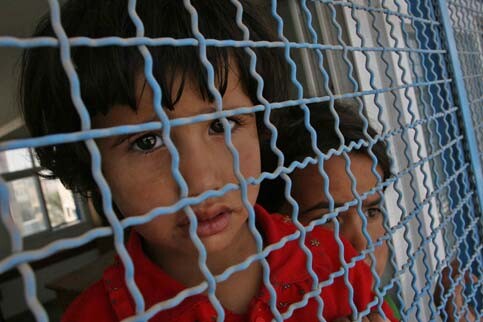SOS Children's Village 9 July 2006

Palestinian refugees from the Al-Shoka village living at a temporary refugee camp in a United Nations school near Rafah in the southern Gaza Strip July 8, 2006. (MaanImages/Hatem Omar)
SOS Children’s Village in Rafah is suffering from severe food, medication and fuel shortages due to the current bombings and blockade by Israel. The situation is threatening to cause a health crisis if not lifted soon.
A group of children gather around their mother who is teaching them how to paint. They make smiling suns and rainbows, clouds with faces and stick figures wearing bright coloured dresses and pants. This scene seems normal enough, but the mothers at the SOS Children’s Village Rafah in the Gaza Strip are painting with the children to distract them from the explosions of bombs.
Since the Israeli bombing and blockade started last month, SOS Children’s Village Rafah has suffered from shortages in many necessities. Lack of essential medicines and food is a main cause of concern at the SOS Children’s Village Rafah. Dr. Kamil El-Shami, project coordinator at SOS Children’s Village Rafah says, “We fear that the continuity of this situation will cause health problems for the children.”
In addition, since the bombing of the Gaza power plant, the SOS Children’s Village Rafah has been relying on its own electrical generator. However, no one knows how long the generator can be utilised. The blockade has also meant a shortage of fuel.
Many of the children at the SOS Children’s Village Rafah are suffering from sleep disorders, fear and anxiety, bed wetting and nightmares. Yet despite having their own problems to contend with, the residents of SOS Children’s Village Rafah are also helping their neighbours. “Because of the shortage of water, SOS Children’s Village Rafah is providing the surrounding community with drinking water from its water well,” El-Shami says.
Since the start of the current conflict, mothers and co-workers of the SOS Children’s Village Rafah stored food, medicine and fuel for several days. Yet the situation remains critical. “Food stuff, medicine, and fuel are stored for one week. It is not possible to store more for longer because of the shortage of food and fuel in Gaza,” El-Shami says.
According to El-Shami, many summer activities for the children were cancelled as a result of the recent bombings. The children are confined mostly to the SOS Children’s Village Rafah, which is considered a safe area. Mothers who were on vacation discontinued their vacations and returned to the SOS Children’s Village to be with their children. Alternative activities are being implemented to distract and comfort the children, including painting, drawing, and singing.
The entire Gaza Strip has been under frequent bombing since 28 June, 2006 when an Israeli soldier was kidnapped[*] by Hamas. Israel has been blocking all goods including foodstuffs, medication and fuel from entering the entire Gaza Strip since the kidnapping. The severe shortage of basic necessities in Gaza is threatening to cause a major health disaster.
[*]Editor’s Note: The dictionary definition of the word “kidnap” necessitates that the abduction of a person is illegal. As the Israeli soldier was part of an occupying force, captured during a military raid against a military target, in international law he is considered to be a “prisoner of war”, not a kidnap victim. The rules governing the treatment of prisoners of war are spelled out in the third Geneva Convention of 1949, article 13 of which requires that POWs “must at all times be treated humanely”.
Related Links